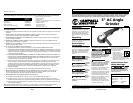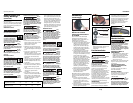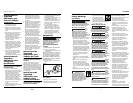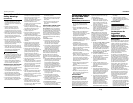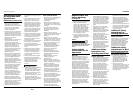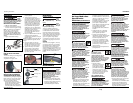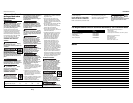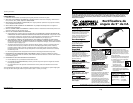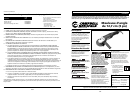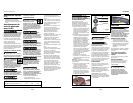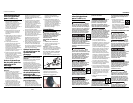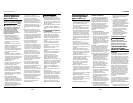
Mientras la herramienta está
encendida, puede presionar el botón
Lock (bloqueo) que mantendrá la
herramienta encendida cuando suelte
el interruptor ON/OFF. Para apagar o
desbloquear la rectificadora,
simplemente presione el interruptor
ON/OFF para soltar el botón de
bloqueo.
Mantenimiento
No
permita
que líquido de frenos, gasolina,
productos a base de petróleo, aceites
penetrantes, etc. entren en contacto
con las piezas plásticas.
Éstos contienen sustancias químicas
que pueden dañar, debilitar o destruir
la caja, comprometiendo la integridad
del doble aislamiento.
MANTENGA LIMPIA LA
HERRAMIENTA
• Todas las piezas de plástico deben
limpiarse con un paño húmedo.
NUNCA use solventes para limpiar
piezas de plástico. Podrían
disolverse o dañar el material de
alguna otra manera.
Después del uso, retire soplando todo
el polvo o los fragmentos de metal
acumulados.
¡NO HAGA NINGÚN AJUSTE
MIENTRAS EL MOTOR ESTÁ EN
FUNCIONAMIENTO!
Consulte la etiqueta para saber la
fecha de fabricación.
SERVICIO TÉCNICO
Para obtener información con relación
al funcionamiento o reparación de
este producto, sírvase llamar al
1-800-424-8936.
El
servicio
de la herramienta debe ser realizado
sólo por personal de reparaciones
calificado. El servicio o mantenimiento
realizado por personas no calificadas
puede provocar riesgo de lesiones.
DG470800CK
23 Sp
L
oc
k
ON/
O
FF
S
witch
Figura 5
Interruptor de ON/OFF (encendido/apagado)
Bloqueo
MONTAJE DE LA RUEDA
ABRASIVA/DE LIJADO/CEPILLO
DE ALAMBRE
Para montar la rueda abrasiva/de
lijado/cepillo de alambre, gire la
rectificadora hacia arriba sobre una
superficie plana y siga las
recomendaciones a continuación.
1. Coloque el reborde del disco sobre el
vástago, con el cuidado de orientar
los dientes del reborde sobre el
vástago. Gire este disco hasta que
quede asentado sobre el vástago.
Una vez bien asentado, debe tener
un pequeño juego lateral.
2. Luego asegúrese de que la rueda
rectificadora/de lijado/cepillo de
alambre tenga un rango que excede
el rango de la rectificadora, es decir,
el disco debe tener un rango
superior a las 11.000 RPM. No use
un disco con rango inferior a 11.000
RPM. Además, asegúrese de que
está montando un disco del tamaño
apropiado. Esta rectificadora está
diseñada para usar discos de 5 pulg.
(125-127 mm).Verifique que los
discos no presenten defectos como
rajaduras, cerdas dañadas u
oxidadas, y problemas similares.
No use nunca uno que esté dañado.
3. Monte el disco sobre el reborde sólo
si se ha determinado que el disco
satisface todos los requisitos
mencionados arriba.
NOTA: Normalmente, el lado donde se
encuentra la información del disco es el
lado que queda posicionado contra el
reborde.
4. Enrosque la tuerca de sujeción
sobre el vástago, asegurándose que
la pestaña interna de la tuerca
quede enroscada dentro del anillo
central del disco.
5. Apriete la tuerca de sujeción con la
llave de 2 dientes en sentido horario
mientras oprima el botón de
bloqueo del vástago, ubicado en la
parte superior de la caja de
engranajes.
Funcionamiento
Manejo de la rectificadora
Mantenga la protección de seguridad
en su lugar para evitar posibles
lesiones graves.
Nunca
cubra las
ventilaciones de aire ya que siempre
deben estar abiertas para el correcto
enfriamiento del motor.
La clave para un funcionamiento
eficiente es controlar la presión y el
contacto con la superficie entre el
disco y la pieza de trabajo.
Las superficies planas se rectifican a un
ángulo agudo, generalmente entre
10 y 20 grados con respecto a la pieza
de trabajo. Permita que el disco
alcance la velocidad máxima antes de
comenzar a rectificar. Un ángulo
demasiado amplio causará la
concentración de la presión en un área
reducida, lo cual puede provocar ranuras
o quemar la superficie de trabajo.
INTERRUPTOR
Una vez enchufada la herramienta, la
única forma de que funcione es
presionando el interruptor ON/OFF.
Ensamblaje
(Continuacion)
Figura 3
Length of Cord in Feet 25 50 100 150
AWG Size of Cord 18 18 18 16
Minimum Wire Size (AWG) of Extension Cord for Grinder
Save all warnings and instructions for
future reference.
The term “power tool” in the warnings
refers to your mains-operated (corded)
power tool or battery-operated (cord-
less) power tool.
WORK AREA SAFETY
Keep
work
area clean and well lit. Cluttered or
dark areas invite accidents.
Do not operate power tools
in explosive atmospheres,
such as in the presence of
flammable liquids, gases or dust.
Power tools create sparks which may
ignite the dust or fumes.
Keep
children
and bystanders away while operating a
power tool. Distractions can cause you
to lose control.
Do not
operate
the power tool near flammable
materials. Sparks could ignite these
materials.
ELECTRICAL SAFETY
Power tool plugs must match
the outlet. Never modify the
plug in any way. Do not use
any adapter plugs with earthed
(grounded) power tools. Unmodified
plugs and matching outlets will reduce
risk of electric shock.
Avoid
body
contact with earthed or grounded sur-
faces, such as pipes, radiators, ranges
and refrigerators. There is an increased
risk of electric shock if your body is
earthed or grounded.
Do not
expose
power tools to rain or wet conditions.
2
Operating Instructions
Water entering a power tool will
increase the risk of electric shock.
Do not
abuse
the cord. Never use the cord for carry-
ing, pulling or unplugging the power
tool. Keep cord away from heat, oil,
sharp edges or moving parts. Damaged
or entangled cords increase the risk of
electric shock.
When
operat-
ing a power tool outdoors, use an
extension cord suitable for outdoor
use. Use of a cord suitable for outdoor
use reduces the risk of electric shock.
If operat-
ing a
power tool in a damp location is
unavoidable, use a residual current
device (GFCI) protected supply. Use of
a GFCI reduces the risk of electric
shock.
• Do not use accessories that require
liquid coolants. Using water or other
liquid coolants may result in
electrocution or shock.
• Make sure cord is located so that it
will not be stepped on, tripped over,
or otherwise subjected to damage or
stress.
• Do not use an extension cord unless
absolutely necessary. Use of
improper extension cord could result
in a risk of fire and electric shock. If
an extension cord must be used,
make sure:
• That the size of the cord is at least as
specified in chart titled “Minimum
Wire Size (AWG) of Extension Cord
for Grinder.”
• That the pins on plug of extension
cord are the same number, size and
shape as those of plug on power
tools.
• That the extension cord is properly
wired and in good electrical
condition.
• If an extension cord is to be used
outdoors it must be marked with the
suffix “W-A” or “W” following the
cord type designation to indicate it is
acceptable for outdoor use. For
example – SJTW-A
• Double insulated tools are equipped
with a polarized plug. This plug will
fit in a polarized outlet one way only.
If the plug does not fit fully in the
outlet, reverse the plug. If it still does
not fit, contact a qualified electrician
to install a polarized outlet. Do not
change the plug in any way. Double
insulation eliminates the need for the
three wire grounded power cord and
grounded power supply system.
PERSONAL SAFETY
Stay
alert,
watch what you are doing and use com-
mon sense when operating a power
tool. Do not use a power tool while you
are tired or under the influence of
drugs, alcohol or medication. A moment
of inattention while operating power
tools may result in serious personal
injury.
Use personal protective
equipment. Always wear eye
protection. Protective equip-
ment such as dust mask, non-skid safe-
ty shoes, hard hat, or hearing protec-
tion used for appropriate conditions
will reduce personal injuries.
Prevent
uninten-
tional starting. Ensure the switch is in
the off-position before connecting to
power source and/or battery pack, pick-
ing up or carrying the tool. Carrying
power tools with your finger on the
switch or energising power tools that
have the switch on invites accidents.
Remove
any
adjusting key or wrench before turning
the power tool on. A wrench or a key
left attached to a rotating part of the
power tool may result in personal injury.
Do not overreach. Keep prop-
er footing and balance at all
times. This enables better
control of the power tool in unexpect-
ed situations.
Dress
properly.
Do not wear loose clothing or jew-
ellery. Keep your hair, clothing and
gloves away from moving parts. Loose
clothes, jewellery or long hair can be
caught in moving parts.
www.chpower.com
General Power Tool
Safety Warnings
(Continued)
Figura 2
Spanner
Clamp Nut
Sandin
g
Disc
Disc Flange
Figura 4
Llave de 2 dientes
Tuerca de sujeción
Disco rectificador
Reborde del disco



